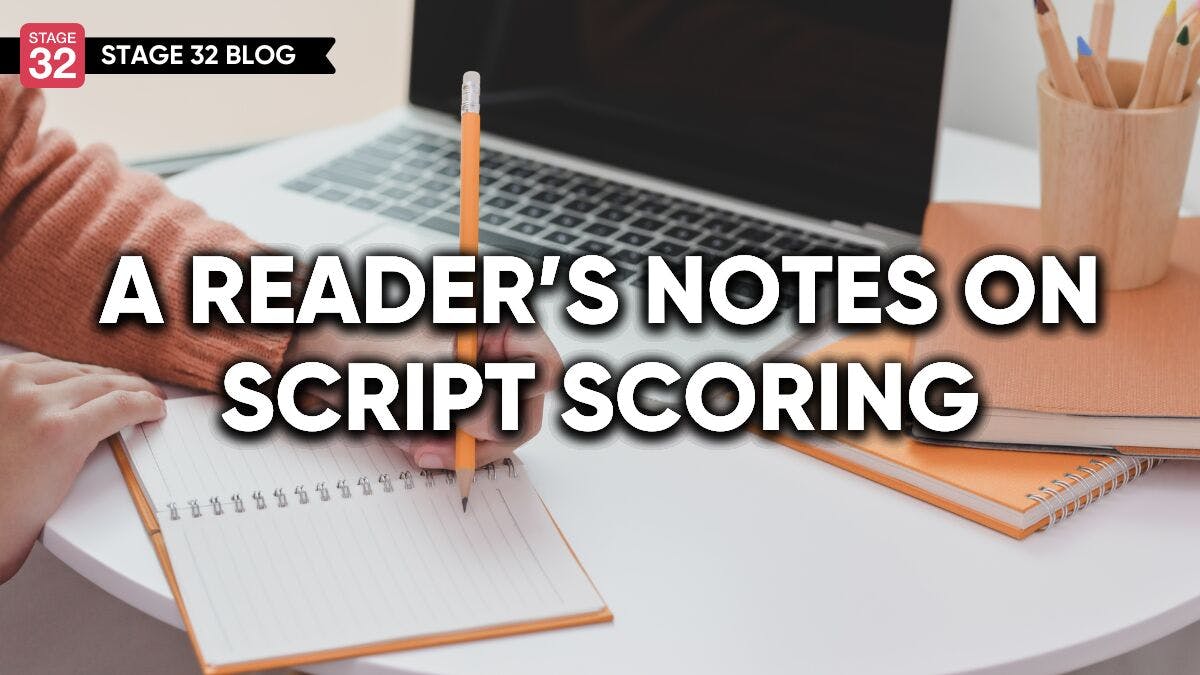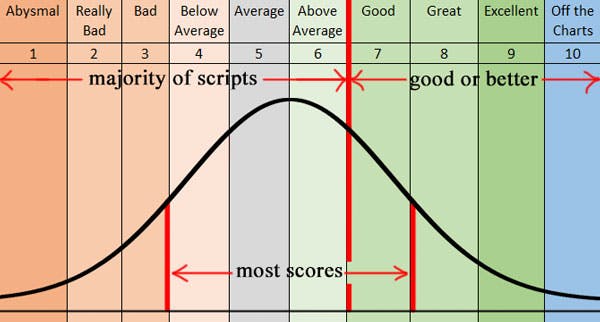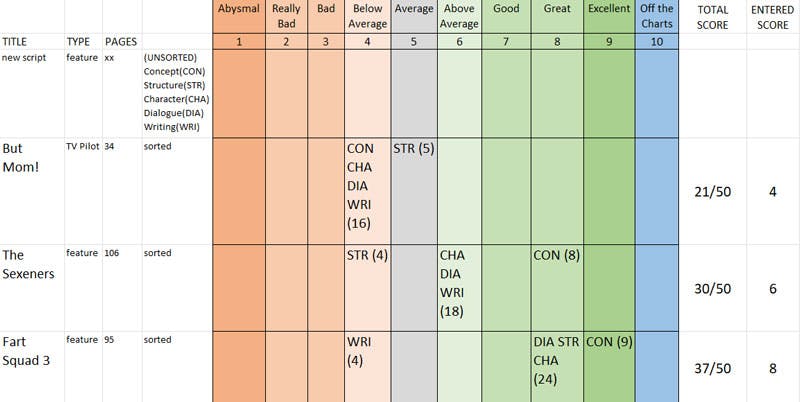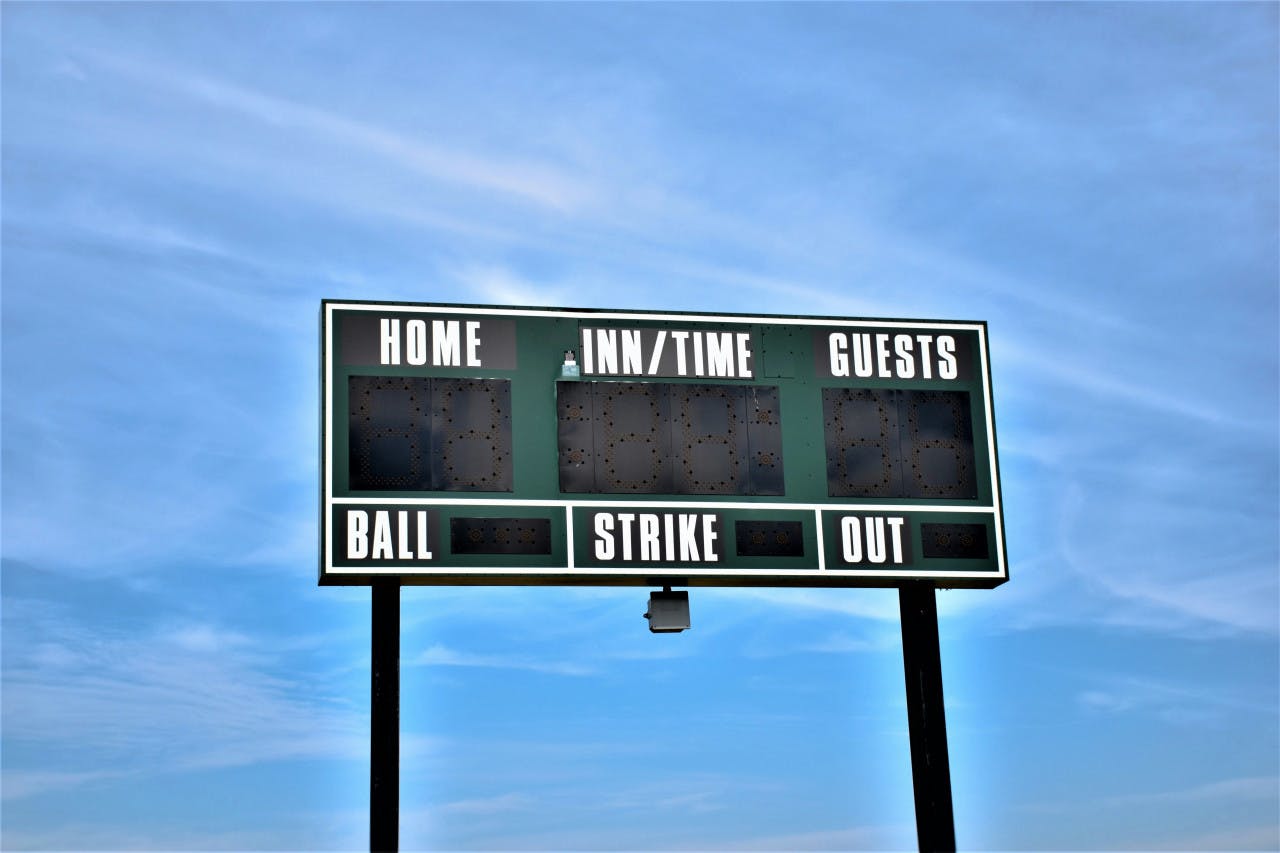A Reader's Notes On Script Scoring

My name is Stephen Notley. I'm a screenplay contest reader as well as a screenwriter, so I've written and received loads of script analyses (also known as "coverage"). With this experience on both sides of the coverage game, I thought I'd offer some thoughts you folks might find useful.
My last blog post was called "A Reader's Notes on Proofreading," which I thought was a nice, simple, straightforwardly objective subject on which to chat. This time, though, I'm going to try to dig a bit deeper. Join me, if you dare, as we explore the scarily subjective subterranean world of... Script Scoring.
What Is Scoring?
Scoring is the process of grading scripts by assigning numbers to different categories of script elements.
As far as I can tell, there are NO well-known industry standards in either the *range* (most use a 10-point scale, but some use a 5-point scale instead) *or* the number and type of categories. The contest I read for has a 10-point scale over 10 categories, but I've received coverage that included percentage ratings for, no joke, 29 different script factors. All that said, three categories are near-universal: Concept, Characters, and Dialogue.
My Scoring Method: How I Score
When I got the reading gig, the first thing I did was establish my baseline rating range for scores:
1 - Abysmal
2 - Really Bad
3 - Bad
4 - Below Average
5 - Average
6 - Above Average
7 - Good
8 - Great
9 - Excellent
10 - Off the Charts
Technically a 10-point rating system doesn't match up correctly with the Bell Curve of a normal distribution, but it works as an approximation, like so:

Assuming the distribution is normal-ish, one would expect most scripts to fall in that middle zone of being somewhere between struggling and almost there, with fewer examples of exceptionally good or bad scripts occupying those higher and lower ratings. And, at least in my observation, this is in fact how and where the scores tend to land.
Spreadsheets Are Magic
Once I had my ratings worked out, the next step was to, of course, like any rational human being, create a spreadsheet.
Lightly fictionalized, it looks like this:

The magical properties of spreadsheets are well known, and this one is no different. Not only does it allow me to keep all the scores I've given in one place, but also allows me to compare the scores I'm giving across multiple scripts. Laying it out this way provides a visual representation of scripts' scores in a way that lets me tell any script from another at a glance.
Let's take a look at these three imaginary scripts in more detail to see what their scores say about them-
But Mom!
Concept Character Dialogue Writing (4), Structure (5)
But Mom! is no fun to read, sadly. Not only are there multiple spelling and punctuation mistakes on every page, but nothing else is working either. The concept is weak, the characters are all the same, and the dialogue is supposed to be funny but is not. It does have a discernible beginning, middle, and end, though, so it gets a 5 for structure. Some scripts are... is there a nice way to say "a slog"? Such a bummer, but that's what happens.
This is basically about as far down as I will score, however. The rating system does have 3s, 2s, and 1s, but giving those scores is just... mean. My job isn't to brutalize or humiliate writers or try to convince them to stop writing. Plus, and more importantly, any writer who actually finishes a screenplay deserves sincere respect for showing up and completing the assignment. So, this terrible script gets a score tally of 21/50, or 0.42, rounded down to a final score of 4. I wish this writer the best, but they have a long way to go.
The Sexeners
Structure (4), Character Dialogue Writing (6), Concept (8)
The Sexeners, meanwhile, has different problems and strengths. It's got a great concept, maybe from some fascinating lesser-known corner of history where the core story is dynamite. There's huge potential for a compelling story in this script. Meanwhile, the characters, dialogue, and writing are mostly there as well. So far, so good. BUT... it's all held back by an overly convoluted structure that breaks things up into so many layers of nested flashbacks that it's a huge struggle to follow what's going on and, sadly, prevents the big emotional moments from landing properly. Strong plusses coupled with unfortunate minuses equals a script with great potential but needs serious work to get there. The final score of 6 means The Sexeners ultimately falls short of what I would call "good" if somebody asked me about it-- though I'd be happy to stipulate that the concept is solid and the overall scriptwriting has potential.
Fart Squad 3
Writing (4), Structure Dialogue Character (8), Concept (9)
Fart Squad 3 is the most imaginary of these imaginary scripts because it is that total unicorn: a script that is littered with agonizingly grotesque spelling and grammar errors on every page but somehow still carries everything else off near-perfectly. The dialogue is hilarious, the characters are distinct and vivid, the concept is truly outstanding, and it all clicks together so every element supports every other element. A blast to read even as I'm tearing my hair out over all the typos. Score tally: 37/50, or 0.74. I could round it down to 7 (that 4 for sloppy writing is really hurting it), but because it truly is a unicorn, and because I did come to enjoy it a lot, and because I did laugh out loud at a couple of places, and because I am seriously considering stealing some of its jokes, I give it the benefit of the doubt and round up for a final score of 8.
And that, in roughly 1000 words, is How I Score!

What About Other Readers?
Honestly? I have NO IDEA how they score. I have been flummoxed and flabbergasted at the weird numbers I've seen readers assign to scripts, both my own and others. The reality is that, just as there's a wide range in the quality of scripts, there's an equally wide range in the quality of readers.
Some have no discernment and give everything 7s, 8s, and 9s (also a tendency of an AI script analyst service I tested). Others hate everything and will only give 3s to 6s. Still others can be just bizarre: I once received a piece of coverage that said in the analysis "This is one of the best and funniest scripts I've read in months" and yet still dinged me with a bunch of 3s and 5s out of 10. Huh? If I liked a script enough to say that, I can't imagine giving it those kinds of scores. WHAT'S THE DEAL?
Scoring Doesn't Matter
The first rule of Scoring is Don't Get Worked Up About Scoring. They always tell you not to get hung up on the numbers. Most providers of coverage I've seen include various disclaimers about how writers should focus on the feedback rather than the scores, that scores are irreducibly subjective, and that different readers might well score the same script differently-- all of which is true. And yet...

Scoring DOES Matter!
The second rule of Scoring is Don't Tell Me Not To Get Worked Up About Scoring I'll Get Worked Up If I Bloody Well Want. It's not as snappy as the first rule, for sure, but I feel the pain. As much as I try to be the good writer, consider the notes and the notes behind the notes, constantly work on improving the craft, blah blah blah... I want those scores, dammit! GIMME THEM GOOD GOOD HIGH SCORES!!!! I don't CARE how dumb they are!
Does Scoring Matter?
I find this the toughest question to answer. One thing I don't do in my analysis is assign a Pass, Consider, or Recommend rating, which seems ultimately more consequential to me. It's not that I wouldn't or couldn't, but it's not my assignment.
In theory, my scores could determine tangible benefits to a writer's career like how far a script advances in a contest, but I don't make any judgments about which scripts move forward. Other folks at the contest make those decisions, and I don't know if my ratings factor into it at all. I just hand out numbers!
Well... and words. I also hand out hundreds or even thousands of words, all cunningly arranged to convey in detail my assessment of the categories I'm analyzing. And those are what's most worth paying attention to, anyway! Fie on scores! FIE I SAY!!!
Let's hear your thoughts in the comments below!
Got an idea for a post? Or have you collaborated with Stage 32 members to create a project? We'd love to hear about it. Email Emily at blog@stage32.com and let's get your post published!
Please help support your fellow Stage 32ers by sharing this on social. Check out the social media buttons at the top to share on Instagram @stage32 , Twitter @stage32 , Facebook @stage32 , and LinkedIn @stage-32 .
About the Author

Stephen Notley
Content Creator, Screenwriter, Story Analyst
Well, the occupation list above doesn't include "Cartoonist," but that's what I mostly am, having regularly drawn the infamous webstrip Bob the Angry Flower for over 25 years while also holding down a game designing job for PopCap Games. With all these years of various funnymaking under my belt, I f...





